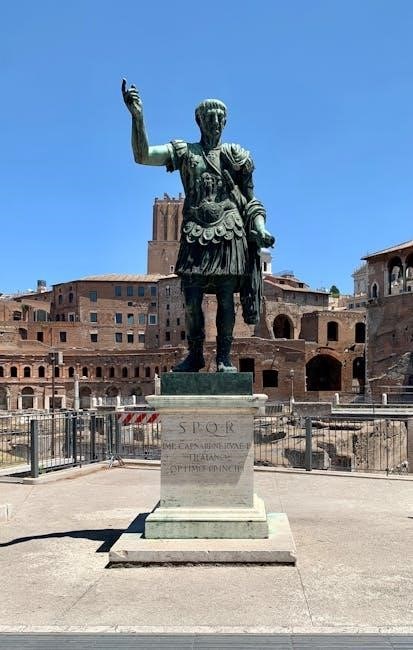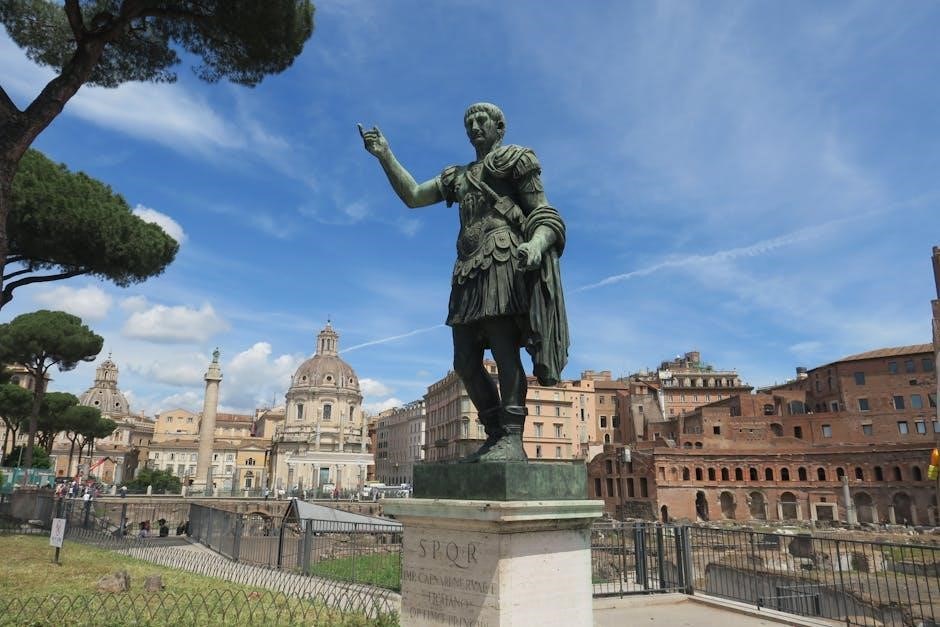William Shakespeare’s Julius Caesar is a tragic drama exploring political intrigue, ambition, and betrayal in ancient Rome, centered around Caesar’s assassination and its aftermath, blending history with timeless themes.
Overview of the Play
William Shakespeare’s Julius Caesar is a tragic drama that delves into the political turmoil of ancient Rome, focusing on the conspiracy against Julius Caesar and its consequences. The play begins with Caesar’s triumphant return to Rome after defeating Pompey, but tensions rise as senators fear his growing power. A group of conspirators, led by Brutus and Cassius, plot and execute Caesar’s assassination, believing it will restore Roman republicanism. However, their actions unleash a power struggle, marked by alliances, betrayals, and civil war. The play explores themes of ambition, loyalty, and fate, ultimately leading to the downfall of the conspirators and the rise of Caesar’s adopted son, Octavius. Shakespeare masterfully weaves historical events with dramatic tension, creating a timeless narrative of human ambition and political intrigue.
Historical Context of Julius Caesar
Shakespeare’s Julius Caesar is set in 44 B.C., a pivotal moment in Roman history, as the Republic transitions toward empire. Julius Caesar’s rise to power, following his victories in Gaul and his crossing of the Rubicon, created tensions among Roman senators who feared his growing authority. The play draws from real historical figures, including Caesar, Brutus, and Cassius, and events like Caesar’s assassination on the Ides of March. Shakespeare’s portrayal reflects the political upheaval of the time, as Caesar’s reforms and centralized power threatened the traditional Roman Republic. The historical context underscores the clash between individual ambition and collective governance, a theme central to the play. By dramatizing these events, Shakespeare explores the complexities of leadership, loyalty, and the consequences of political upheaval.
Historical Background
The late Roman Republic saw rising tensions between the Senate and Julius Caesar, whose military victories and reforms threatened traditional power structures, fueling political and social unrest.
Rome in 44 B.C.
In 44 B.C., Rome was a republic teetering on the brink of transformation. The city was politically unstable, with growing tensions between the Senate and Julius Caesar, who had amassed significant power through military conquests. The Roman Republic, established centuries earlier, was struggling to maintain its traditional governance structure amid rising corruption and inequality. Social unrest was prevalent, with the plebeians often at odds with the patrician class. The year marked the culmination of Caesar’s rise, as he was appointed dictator for life, further antagonizing the Senate. This period also saw the festival of Lupercal, a significant event in the play, where Caesar’s ambitions were openly celebrated. The assassination of Caesar on the Ides of March would forever alter Rome’s trajectory, plunging it into civil war and eventual imperial rule under Caesar’s adopted son, Octavian.
Julius Caesar’s Rise to Power
Julius Caesar’s ascent to dominance began with his strategic alliances and military prowess. He formed the First Triumvirate with Pompey and Crassus, consolidating political influence. His victories in Gaul expanded Rome’s territories and enriched its coffers, earning him immense popularity. Caesar’s charisma and ability to connect with the common people further solidified his position. His appointment as dictator, initially temporary, became permanent in 44 B.C., sparking Senate fears of monarchy. Caesar’s reforms, such as the Julian calendar, showcased his leadership. However, his concentration of power and disregard for traditional norms led to resentment among the elite, ultimately culminating in his assassination. Caesar’s legacy as a brilliant yet controversial leader endures, shaping Rome’s transition from republic to empire.

Plot Summary
The play explores Julius Caesar’s assassination and its aftermath, delving into themes of ambition, betrayal, and power struggles. It portrays the conspiracy, Caesar’s death, and the ensuing civil war, highlighting the tragic consequences of political ambition and the rise of new leaders.
Act 1 of Julius Caesar sets the stage in Rome, where Julius Caesar is celebrated for his victory over Pompey’s sons. The act introduces key characters, including Brutus and Cassius, who express concerns about Caesar’s growing power. Meanwhile, Caesar’s wife, Calpurnia, shares ominous dreams, warning of impending danger. A soothsayer famously warns Caesar, “Beware the Ides of March,” but Caesar dismisses the prophecy. Cassius, envious of Caesar’s rising influence, begins to conspire against him, manipulating Brutus into joining the plot. The act ends with Brutus and Cassius planning Caesar’s assassination, driven by their fear of his potential tyranny. This act establishes the tension between loyalty and ambition, setting the stage for the tragic events to unfold.
Act 2: The Assassination of Caesar
Act 2 centers on the conspiracy unfolding as Julius Caesar ignores warnings from his wife, Calpurnia, and a soothsayer about impending danger. Despite these omens, Caesar attends the Senate, where Brutus, Cassius, and other conspirators ambush him. They stab Caesar repeatedly, with Brutus delivering the final blow. Caesar’s last words, “Et tu, Brute?” (“And you, Brutus?”), reflect his shock and betrayal. The conspirators justify their actions as a defense of Rome’s liberty, while Mark Antony, loyal to Caesar, mourns his death. The act concludes with the conspirators celebrating their deed, unaware of the chaos and power struggles their actions will provoke. This pivotal act explores themes of betrayal, ambition, and the consequences of political violence.
Act 3: Aftermath and Power Struggle
Act 3 explores the chaotic aftermath of Caesar’s assassination and the ensuing power struggle. Mark Antony delivers a masterful funeral oration, manipulating the crowd’s emotions to turn them against the conspirators. Meanwhile, Antony, Octavius, and Lepidus form an alliance to avenge Caesar’s death and eliminate their political rivals. Brutus and Cassius, realizing their precarious position, prepare for war. Antony’s strategic brilliance and emotional appeal set the stage for a fierce civil war, as loyalty, ambition, and revenge collide. This act highlights the instability of political alliances and the rapid escalation of violence following Caesar’s death, foreshadowing the downfall of the conspirators and the rise of a new order.
Act 4: Civil War and Betrayal
Act 4 delves into the escalating civil war and the unraveling of alliances. Antony, Octavius, and Lepidus confront Brutus and Cassius at Philippi, where the conspirators face internal strife. Brutus’s leadership is challenged as Cassius’s distrust grows, weakening their resolve. The battle results in heavy losses for Brutus and Cassius, forcing them to flee. Meanwhile, Brutus experiences a haunting vision of Caesar’s ghost, symbolizing his inevitable doom. The act highlights betrayal on multiple fronts, as even loyal allies turn against each other. The shifting tides of war and personal betrayals culminate in a tragic unraveling, setting the stage for the final confrontation in Act 5. The themes of loyalty, fate, and ambition reach a boiling point, driving the characters toward their ultimate destinies.
Act 5: The Final Battle and Deaths
Act 5 culminates in the climactic Battle of Philippi, where Antony and Octavius confront Brutus and Cassius. The conspirators, overwhelmed by the enemy’s strength, suffer a devastating defeat. Cassius, mistakenly believing Brutus has been captured, orders his loyal servant Pindarus to kill him. Brutus, discovering Cassius’s body, mourns the loss of his friend and ally. As the battle concludes, Brutus takes his own life, earning Antony’s respect as “the noblest Roman of them all.” The act concludes with Antony and Octavius victorious, marking the end of the conspiracy and the rise of a new political order. The final deaths underscore the tragedy of ambition and betrayal, leaving a legacy of honor and regret in their wake.

Major Themes
Power and Ambition: Caesar’s rise and fall highlight the dangers of unchecked power. Loyalty and Betrayal: Friendships crumble as personal motives override duty. Fate vs. Free Will: Characters struggle between destiny and choice.
Power and Ambition
Shakespeare’s Julius Caesar delves into the corrupting influence of power and the destructive nature of ambition. Caesar’s rapid rise to dictatorship alarms the Roman senators, who fear his dominance will undermine the Republic. Brutus, though noble, is swayed by Cassius’s manipulation, revealing how even virtuous individuals can succumb to ambition. Caesar’s own ambition blinds him to threats, as he dismisses warnings from his wife, Calphurnia, and the soothsayer. The play illustrates how the pursuit of power leads to betrayal and violence, as characters like Cassius and Brutus justify murder to prevent Caesar’s tyranny. Ultimately, the tragedy underscores the delicate balance between leadership and tyranny, highlighting the dangers of unchecked ambition and the inevitable consequences of its pursuit.
Loyalty and Betrayal
Loyalty and betrayal are central themes in Julius Caesar, as characters grapple with conflicting loyalties to Rome, its leaders, and their own ideals. Brutus, though deeply loyal to the Roman Republic, betrays Caesar out of a misguided belief in preserving liberty. His decision to join the conspiracy highlights the tension between personal loyalty to a friend and loyalty to a greater cause. Conversely, Mark Antony remains steadfastly loyal to Caesar, even after his death, transforming his grief into a quest for justice. The play explores how betrayal, often justified as loyalty to a higher principle, leads to devastating consequences. Caesar’s trust in Brutus, despite warnings, underscores the tragedy of misplaced loyalty and the destructive power of betrayal.
Fate vs. Free Will
The interplay between fate and free will in Julius Caesar is a profound theme, as characters navigate destiny and personal choice. Caesar’s belief in fate is evident when he dismisses warnings about his death, showcasing his acceptance of destiny. Conversely, Brutus and Cassius exercise free will by orchestrating the conspiracy, believing their actions are necessary for Rome’s future. The soothsayer’s warning to Caesar—”Beware the Ides of March”—symbolizes fate’s inevitability, yet Caesar’s disregard for it highlights his belief in control over his destiny. Meanwhile, Brutus’s internal conflict reflects the tension between fate and personal agency, as he struggles with loyalty to Rome and friendship with Caesar. The play ultimately suggests that while fate may shape outcomes, human decisions drive the tragic events, blending destiny with individual responsibility. This duality underscores the complexities of human action and divine will.

Key Characters
Julius Caesar, Brutus, and Mark Antony are central figures, each embodying distinct traits: Caesar’s ambition, Brutus’s nobility, and Antony’s cunning, driving the play’s tragic events and political turmoil.
Julius Caesar: The Tragic Hero
Julius Caesar, the titular character, is a complex figure whose ambition and confidence lead to his downfall. As a tragic hero, Caesar embodies both admirable qualities and fatal flaws. His rise to power and popularity among the Roman people create envy and fear among the conspirators. Despite warnings, such as Calpurnia’s prophetic dreams, Caesar’s hubris and belief in his invincibility make him vulnerable to betrayal. His assassination serves as a turning point in the play, highlighting the consequences of unchecked ambition and the fragility of human greatness. Caesar’s legacy endures, but his tragic fate underscores the dangers of hubris and the unpredictable nature of political power, making him one of Shakespeare’s most compelling tragic heroes.
Brutus: The Noble Conspirator
Brutus, a central figure in the conspiracy against Caesar, is portrayed as a noble yet conflicted character. Driven by a sense of duty to Rome and a belief in the Republic, Brutus is convinced that Caesar’s death is necessary to prevent tyranny. His internal struggle is evident as he grapples with the moral implications of assassination. Despite his noble intentions, Brutus’s idealism and naivety lead to tragic consequences. His leadership in the conspiracy highlights his commitment to honor and patriotism, but his failure to anticipate Mark Antony’s reaction ultimately seals his fate. Brutus’s death marks the end of the Republic and the rise of the Empire, cementing his place as a tragic figure in Shakespeare’s exploration of loyalty, honor, and the complexities of political ambition.
Mark Antony: The Cunning Politician
Mark Antony emerges as a masterful politician and one of Caesar’s most loyal allies. His charisma and rhetorical skills are on full display as he manipulates public opinion after Caesar’s assassination. Antony’s funeral oration, where he famously declares, “Friends, Romans, countrymen, lend me your ears,” is a testament to his ability to sway emotions and rally support. His alliance with Octavius and Lepidus forms the Second Triumvirate, which ultimately leads to the downfall of Brutus and Cassius. Antony’s cunning and strategic thinking make him a formidable force, yet his personal ambitions and eventual rivalry with Octavius set the stage for his tragic demise. His character serves as a compelling study of power, loyalty, and the art of political maneuvering in Shakespeare’s exploration of ancient Rome’s tumultuous landscape.

Adaptations and Interpretations
Shakespeare’s Julius Caesar has been reimagined in various stage productions, films, and modern retellings, such as Gregory Doran’s African-set version and a 1953 film starring Marlon Brando, showcasing its enduring relevance and adaptability across cultures and mediums, with interpretations often highlighting its political and emotional depth.
Stage Productions and Modern Retellings
Shakespeare’s Julius Caesar has been reimagined in numerous stage productions, often with innovative settings and interpretations. Gregory Doran’s adaptation, for instance, relocates the play to Africa, infusing it with vibrant cultural elements while maintaining its core themes. Similarly, modern retellings have experimented with contemporary contexts, such as corporate boardrooms or political rallies, to highlight the timeless relevance of its exploration of power and ambition. These adaptations often emphasize the play’s universality, making it accessible to diverse audiences. For example, a 2018 production in New York incorporated modern attire and technology to draw parallels with current political climates. Such reinterpretations demonstrate how Julius Caesar remains a powerful lens for examining leadership, betrayal, and societal conflict in both historical and contemporary settings.
Film and Literary Adaptations
Shakespeare’s Julius Caesar has inspired numerous film and literary adaptations, each offering unique interpretations. The 1953 film, directed by Joseph L. Mankiewicz, remains a classic, featuring Marlon Brando as Mark Antony and James Mason as Brutus. A 1970 adaptation, directed by Stuart Burge, stars Charlton Heston as Caesar and Jason Robards as Brutus. Orson Welles also directed a film version in 1937, emphasizing the political turmoil. In literature, the play has influenced works like Robert Harris’s Cicero trilogy, which explores the era’s political landscape. A 2002 TV movie, Julius Caesar, offered a modern take with an ensemble cast. These adaptations highlight the enduring relevance of the play’s themes, such as power struggles and betrayal, resonating across mediums and generations.
Shakespeare’s Julius Caesar remains a timeless exploration of power, ambition, and human nature, offering enduring insights into political intrigue and moral dilemmas, resonating across centuries and cultures.
Legacy of Julius Caesar
Julius Caesar’s legacy endures as a transformative figure in Roman history, shaping its political landscape through his rise and tragic fall. His leadership redefined Rome’s governance, transitioning from a republic to an empire under his adopted son, Octavian. Caesar’s impact extended beyond politics; his military strategies and legal reforms influenced future leaders. Shakespeare’s portrayal immortalized his story, blending history with drama to explore themes of ambition and power. Today, Caesar remains a symbol of both brilliance and caution, reminding us of the delicate balance between leadership and tyranny. His influence continues to inspire and educate, ensuring his place in the annals of history and literature.
Relevance in Modern Times
Despite being written centuries ago, Julius Caesar remains remarkably relevant, offering insights into timeless themes like power, ambition, and betrayal. Modern audiences draw parallels between Caesar’s rise and fall and contemporary political struggles, highlighting the enduring nature of human ambition. The play’s exploration of conspiracy, leadership, and moral dilemmas resonates in today’s world, where political intrigue and corruption are prevalent. Adaptations of the play, such as Gregory Doran’s African-set production, demonstrate its universal appeal and adaptability. The story serves as a cautionary tale, reminding leaders and society of the dangers of unchecked power and the complexities of human nature. Its themes continue to spark critical thinking, making it a vital work in understanding both history and modern society.
